Three little but important publishers
Vendelín Steinhauser, Sfinx and Kniha Zlín
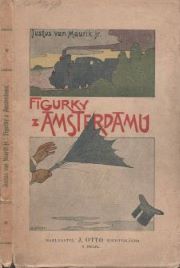
The Czech translation of Justus van Maurik's popular novel Uit het volk (1898)
In the Czech lands, as in many Central European countries, the publishing market fully developed in the second half of the nineteenth century. In 1869, the press law was liberalised, which made it much easier to start a publishing company. Massive use was made of this opportunity. Foreign literature in translation was initially published mainly in magazines. At that time, there was not yet enough Czech readers to justify the financial risks of publishing books.
From the 1880s onwards, in the context of growing political pillarisation and, at the same time, increasing literacy among workers and peasants, both Catholic and Socialist publishing houses began to compete for the favour of lower-class readers. This was usually done through inexpensive series such as the Knihovna pro lid (Library for the People), Zábavní biblioteka (Amusing Library) or Zábavní večerní (Amusing Evening Readings). As the series titles indicate, it was more about easy-to-read low brow books that could be produced quickly and cheaply than about high brow literature. From Dutch-language production especially works by Hendrik Conscience, Jacob Jan Cremer, Jan Renier Snieders and Justus van Maurik found their way into these series.
Vendelín Steinhauser
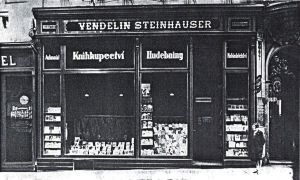
Entrance to Steinhauser's bookshop in Plzeň (Pilsen) around 1900
Alongside the big pillars, however, there was also room for non-politically oriented publishers, who aimed at a more demanding readership and could therefore afford more expensive editions. One of the most notable publishers in this category was Vendelín Steinhauser in the city of Plzeň (Pilsen). This city, which had grown rapidly since the founding of the still existing Škoda engine factory in 1869, was predominantly Czech-speaking, but in the 19th century Pilsen had a sizeable minority of about 15% German-speaking inhabitants (by comparison, Prague had about 18% German-speaking population at the end of the 19th century).
Steinhauser was notable for avoiding the tendency to focus either on the Czech or on the German-speaking reader. Of the literary books published by this publisher between 1869 and 1932, approximately 95 titles were in Czech and 55 in German. A second remarkable fact was that Czech-language literary production consisted mainly of translations of foreign novels. Steinhauser (c.1845-1885) was married to Rosina Hansen (c.1850-1915), who came from a family of German-speaking booksellers from České Budějovice (Budweis). After Rosina's death the firm was taken over by other Czechs who maintained the publishing policy until 1934.
Steinhauser worked together with the gymnasium director Václav Petrů (1841-1906) who was the first to write a Czech-language history of world literature and was also the first Czech translator known to translate directly from Dutch. He advised publishers on interesting foreign literature and ensured quality translations. In 1884 Petrů set up a series of Klasy (Selected Works) for Steinhauser with the aim of offering a "series of original and translated novels and collections of short stories" of quality. Due to Steinhauser's death in 1885, the series was limited to two volumes, both translated from Dutch - the novel In 't wonderjaer 1566 (The Miraculous Year 1566) by the known Flemish writer Hendrik Conscience and the collection Een zomer in 't Noorden. Een zomer in 't Zuiden (A Summer in the North. A Summer in the South) by the Dutch writer Gerard Keller (1829-1899). It was the first time in the history of the Czech reception of Dutch literature that a series was set up in which this literature played an important part.
Sfinx / Bohumil Janda
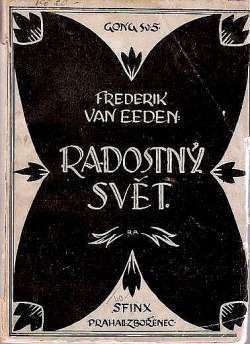
The Czech translation of Happy Humanity (1922)
The foundation of Czechoslovakia in 1918 had great consequences for the Czech book market. In the new state, the Catholic part of the population was now reduced to a (significant) minority. The political character of the new state was predominantly social democratic. The former underclass of workers had become the middle class of society and social-democratic publishers such as Melantrich, Orbis or the formally neutral Družstevní práce (Cooperated Labour) determined the market. Although the general public still had a clear preference for the light genre and preferred to read detective novels or cowboy stories, all publishing houses also tried to educate their readership.
A newcomer on the book market was the liberal publisher Sfinx. The founder, Bohumil Janda (1900-1982), was strongly interested in occult books and published his first book on the Jewish kaballa in 1919. From this occult interest he published several works by the Dutch writer Frederik van Eeden in translation, such as Happy Humanity and A Study of Dreams. However, Janda neglected to apply for the mandatory publisher's licence. He was fined for this in 1924, after which he applied for and obtained the licence.
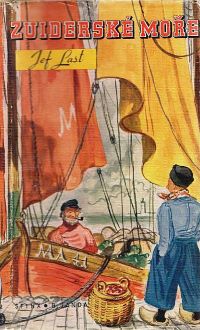
The Czech translation of Jef Last's novel Zuiderzee (1936)
In 1925, his older brother Ladislav Janda (1898-1984) also started a publishing house, named Kramerius after the first Czech publisher Václav M. Kramerius (1753-1808). This publishing house was strictly literary. In 1933, the two brothers merged their publishing houses as Sfinx/Bohumil Janda. From then on, the publishing house focused on – as the Sfinx advertising coin from 1929 reported – cheap valuable literature. In 1935 the brothers, under the editorship of Ladislav, founded the Evropská literární knihovna (European Literary Library). This was a subscription-based literary book club offering a mix of high-quality Czech and foreign literature. The literary editor of the series was Václav Tille (1867-1937), professor of comparative history at Charles University in Prague, co-founder of the Czech PEN Club in 1925 and the most important conservative-liberal literary critic of the interwar period.
ELK's series included several current Dutch-language novels, such as Oriëntexpres (Orient Express) by A. den Doolaard, Rubber by Madelon Székely-Lulofs and Zuiderzee (The Zuiderzee) by Jef Last. These novels were mostly translated by the most important Dutch translator, Lída Faltová (1890-1944). ELK was one of the Czech publishing houses which continued to function during the German occupation in the period 1939-1945, without making concessions to the ideology of the occupying forces. The book club character was of great importance here, since book production was not freely marketable. In these years ELK and Sfinx published mainly rural novels such as Minnehandel in Vlaanderen (Love Trade in Flanders) by Stijn Streuvels or Het leven van Herman Coene (The Life of Herman Coene) by Ernest Claes.
After a brief revival in the first, still democratic post-war years 1945-1948, during which Sfinx published popular novels such as Doctor Vlimmen by Anton Roothaert or De vrijheid gaat in 't rood gekleed (Freedom is Dressed in Red) by Theun de Vries, Sfinx and the imprint ELK were confiscated by the new communist regime in 1949.
Bohumil Janda
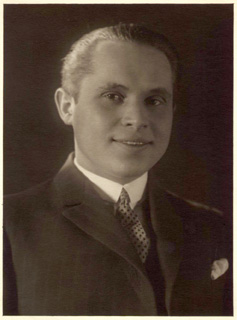
Bohumil Janda was one of the most internationally oriented Czech publishers. He was a member of the International Publishers Association in 1936 and chairman of the Czech section. After the Second World War, he founded the Publishers' Association of Small Nations with German-Jewish writer Max Tau (1897-1976) in 1948, called for short The Bridge after itsemblem showing Charles Bridge in Prague. This association wanted to improve the position of 'peripheral' literatures by publishing one novel a year from each of the participating countries in all the languages of the group. The Dutch-language novel chosen was Het verjaagde water (Roll Back the Sea) by A. den Doolaard.
Due to the Communist takeover on 25 February 1948, the plans were never carried out, although Jana made another attempt in 1968. Even after the nationalisation and closure of his publishing house, Janda remained loyal to the book trade and helped e.g. friendly Dutch publishers such as the Flemish Angèle Manteau with arranging contracts in Czechoslovakia.
Kniha Zlín
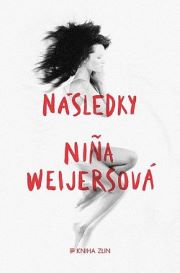
The first four years after the end of the communist regime in November 1989 are also known as the ‘wild years’. A huge number of new small publishing houses emerged, while the old familiar publishers often went bankrupt in the 1990s. As a result, many cheap reprints of successful novels like Székely-Lulofs' Rubber were published and the situation on the book market was extremely unsettled.
Former students of Dutch, often working as translators themselves, tried several times to create order in the situation for Dutch literature. Petra Schürová, for instance, together with colleagues, set up the Nizozemská edice (Dutch edition) series at the film publishing house Cinemax. The market stabilised after 1999 when Dutch and Flemish literary funds started to support translations.
One of the initiatives for strictly literary editions is the publishing house Kniha Zlín, founded in 2004. Since 2014, the Dutchwoman and literary translator Lucie Smolka Fruhwirtová has been working at this publishing house, now as the editor-in-chief. The objective is to publish quality literature, translated by good recognised translators and professionally edited. As the publisher's website states, attention is also paid to good layout.
Kniha Zlín focuses on young and less well-known authors who may be of interest to Czech readers. The publisher has already published several translations from Dutch, such as Het huis van de moskee (The House of the Mosque) by Kader Abdolah and Slaap! (Sleep!) by Annelies Verbeke. Among children's literature, mention should be made of Rivieren (Rivers) by the Flemish author Peter Goes.
In 2017, the publishing house became part of the Albatros Media group, the largest group on the Czech book market.
References
Engelbrecht, Wilken (2021). Van Siska van Rosemael tot Max Havelaar. Nederlandstalige literatuur in Tsjechische vertaling tussen 1848 en 1948. Gent: Academia Press, pp. 39 (Sfinx), 68 (Steinhauser) and 136-137 (Sfinx and Bohumil Janda).
Nondková, Michaela (2000). “Václav Petrů”. In: (ed.) Jiří Opelík, Lexikon české literatury. Osobnosti, díla, instituce 3 (M-R), sv. 2 (P-Ř). Praha: Academia, pp. 893-895.
Smolka Fruhwirtová, Lucie et al. (2021). “O nakladatelství Kniha Zlín”. Online: https://www.knihazlin.cz/c/o-nas/
Soldán, Ladislav (1985). “ELK”. In: Vladimír Forst, Lexikon české literatury. Osobnosti, díla, instituce 1 (A-G). Praha: Academia, pp. 656-659.
Venyš, Ladislav (2000). Nakladatel Bohumil Janda a Evropský literární klub. Praha: ELK.
Zach, Aleš (2008). ”Sfinx”. In: (ed.) Luboš Merhaut, Lexikon české literatury. Osobnosti, díla, instituce 4 (S-Ž). Dodátky k LČL 1-3. A-Ř i S-T. Praha: Academia, pp. 502-505.
Zach, Aleš (2020). “V. Steinhauser. Knihkupectví s českou a německou nakladatelskou produkcí v Plzni; knihtiskárna“. Slovník českých nakladatelství 1849-1949. Online: https://www.slovnik-nakladatelstvi.cz/nakladatelstvi/v-steinhauser.html.
